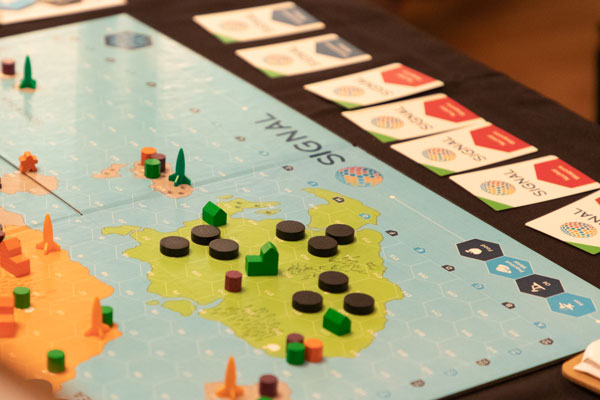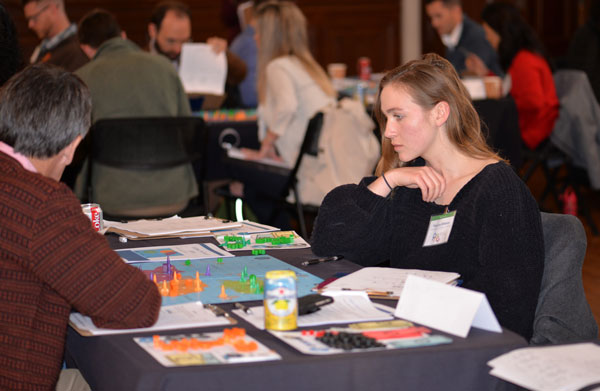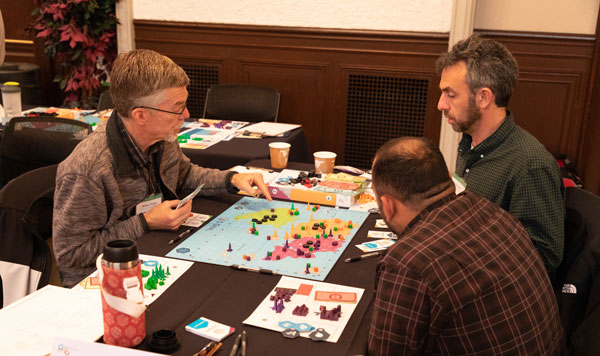
The next generation of nuclear security experts is being trained in an exciting new way — by playing a first-of-its-kind war game Sandia helped design.
The game, Signal, which goes online this spring after its launch as a board game last year, offers players a chance to make strategic decisions using modern political, economic and military tools. By analyzing players’ strategies, researchers seek to better understand how new experimental gaming techniques can deepen insight into conflict escalation and the potential implications of new weapon types and technologies.
The operative word is “modern.” Studying the past has limitations when trying to understand how to prevent military aggression today and in the future, said Sandia systems analyst Jason Reinhardt.
“Look at the Peloponnesian War and think about what that has to do with a cyberattack in the 21st century — probably not a lot. But people do that all the time, trying to learn as much as possible from historic case studies,” he said.
Even applying Cold War concepts to the modern world is challenging, Jason said. Countries are much more interconnected today, and as a result, international relations are more complex.
The Project on Nuclear Gaming (PoNG) is a University of California, Berkeley-led effort funded by Carnegie Corp. of New York, with Sandia and Lawrence Livermore national laboratories working in partnership. Earlier work at all three institutions paved the way for the current project.
Rules of engagement

The U.S. has a history of seeking insights into conflict by observing the strategies and tactics of high-ranking military and government officials engaged in artificial war game scenarios. While the expertise of the participants in these traditional seminar-style, scenario-based war games is valuable, they aren’t designed to lead to statistically significant conclusions — there are too few participants, they occur too infrequently and it is difficult to combine the outcomes of games based on different scenarios.
With its new approach, the project has created a way to observe thousands of playthroughs by different players in a game involving cyber, conventional and nuclear capabilities. The data collected will allow university and lab researchers to examine the variety of strategies that players employ and scenarios that arise in an escalating conflict when new technologies are available.
The board game is designed for three players who each represent a hypothetical country. Players can build towns and cities as well as defensive infrastructure and military bases. Their arsenals include naval, cyber and high-precision, low-yield and electromagnetic pulse nuclear weapons.
Examining players’ patterns
Play begins with a diplomacy, or “signaling,” phase from which the game takes its name, Signal. Players work simultaneously and indicate their intentions to take different courses of action, such as building cities or military bases, or waging military attacks. They can also form alliances and make trade or other agreements with each other. In the next rounds, players take turns deciding whether to take the actions they signaled previously.
In addition to signaling, some key elements of the game are bargaining, where players react to signals and make deals across the table with others, and uncertainty, because one can’t ever really know how someone will respond until they do.
Sandia systems engineer Laura Epifanovskaya reports that in early plays of the board game, the team observed players engaging in a series of build-ups and stand-downs of weapons.

“Players will signal back and forth to each other, look across the table and ask, ‘Do we really want to do this?’ Then players start removing some of their signals and instead look to make trade deals,” she said.
The electronic version of the game will allow researchers to track every move players make and their communications with each other through online chat logs. This will help researchers understand the extent to which signaling affects the escalation and de-escalation they see.
Learning by design
Through designing the game, analyzing data collected during game play and playing the games themselves, graduate students are gaining valuable insight into big questions about human behavior in conflict escalation and the implications of new technologies.
The PoNG team recruits early-career security specialists and graduate students in related fields to play the board game, giving them a chance to practice real-time strategic decision making. Computer science majors from UC Berkeley helped build the e-version of the game, and Jason said the process in some cases is inspiring them to pursue public sector careers.
“Many of these students were planning to work for tech firms, and now they’re seriously looking at careers in government and national security because of this project,” he said.
With support from Carnegie, the Berkeley students also are analyzing the data collected during game play and discovering deep satisfaction from contributing to a body of knowledge with such far-reaching consequences, Jason said. “My university colleagues tell me this project has enabled them to think about subjects they’d never have otherwise learned about,” he added.
Sheryl Hingorani, senior manager for systems analysis, feels the intergenerational nature of the PoNG team is one of the most exciting aspects of the project. “The different levels of experience make this a deep learning exercise for everyone involved,” she said.
With the launch of the e-game this month, the team will be looking for players. To learn more or to sign up, visit the project website.